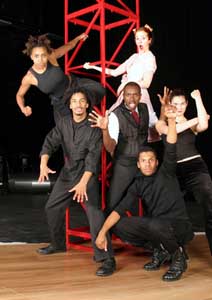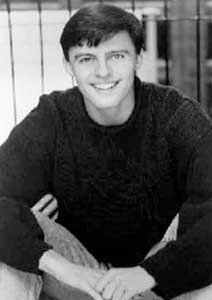-
- Mass. lawmakers opposed to gay marriage devise alternate plan
- Gay marriage ban proposed for Wisconsin
- Ga. House members fuming over antigay sermons
- Bush vows to push antigay marriage amendment
- Wash. state appeals court upholds gay ruling
- N.M. House restores anti-bias protections
- Ohio governor signs gay marriage ban
- National News Briefs
- World News Briefs
Arts & Entertainment
Uncle Tom’s New Jack theatre
UCSD director takes on race in America
Published Thursday, 12-Feb-2004 in issue 842
Bill Fennelly likes a good challenge — particularly if it relates to the theatre and involves exploding age-old political and social constructs. Fennelly, 30, is an accomplished theatre director finishing up his MFA at UCSD. His last show with the university, I Ain’t Yo Uncle: The New Jack Revisionist Uncle Tom’s Cabin takes on race in America, using music, dance, masks, rap and film to deconstruct two hundred years of American iconography.
Based on Harriet Beecher Stowe’s Uncle Tom’s Cabin, an abolitionist novel that many people argue was influential in beginning the Civil War, Robert Alexander’s I Ain’t Yo Uncle recasts Stowe’s characters based on 20th century constructs.
“The reason I love this play is that no one is let off the hook,” Fennelly said. “The subtitle The New Jack Revisionist’s Uncle Tom’s Cabin is really telling; the show is hijacked by Harriet Beecher Stowe’s characters, and she is arrested and put on trial for misrepresentation, essentially. It is a constant battle between these characters for narrative control of their story — in order to reinvent who they are based on a hundred and fifty years of history.”
For example, George, a runaway slave, is based on black revolutionary figures such as Malcolm X, Uncle Tom channels Martin Luther King, Jr. and Eva, with a little twist of Shirley Temple, personifies white American liberalism.
“The production is enormous,” Fennelly said. “You come into the play expecting to see something totally different, and it begins like the greatest musical you’ve ever seen. I decided to frame it with that construction based on the notion of seducing the audience. I remember that the playwright [Alexander] once said, ‘one good laugh can explode cultural stereotypes that arguments can’t touch.’ This play, as explosive and as truly painful as it can be at times, is hilarious — it really uses minstrel-show melodrama and musical comedy to get people engaged. It entertains them and then at a moment’s notice it will turn around and sock them in the gut.”
Fennelly, who has directed a broad range of theatre, from traditional plays and operas to musicals and a play for the National Theatre of the Deaf, feels connected to the subject of his latest play, drawing parallels to his own life.
“Because I am a gay man and because I’ve been politicized that way, I was really interested in the subject of race and class in America, and interested in challenging the racist nature of America,” he said. “I am not a black man — I’m a white gay man. I think the fact that I am a gay man who grew up in white middle class society in Connecticut was formative for who I am. In terms of power structure in America, I grew up within that majority, in that white male world, but I was always the other, always aware of being outside of it. That was constantly juxtaposed for me — being the other and being part of the powerful white male culture in America. It really set me going as an artist.”
The theatre was a natural outlet for him. Born in Connecticut, Fennelly was raised between several major American regional theatres, and started working in them first as an actor, building his way up to assistant director and director while attending college at the Greater Hartford Academy of the Arts and the Hartt School at the University of Hartford in the early ‘90s.
“You come into the play expecting to see something totally different, and it begins like the greatest musical you’ve ever seen.” “I feel like I grew up learning how to play a provocative piece — really how to seduce people, drawing people in so they can listen,” he said. “I think the theater more than anything else, because it’s live, because it’s so visceral and immediate, has the power to really engage people. You have to be very careful how to confront the audience, because if you attack them, I think you can lose them.”
After finishing his undergrad work, Fennelly directed regional theatre along the East coast before moving to New York at the age of 24, where he spent three years as a staff director at Lincoln Center, directing opera. While there, he worked on other shows around the city, including as the associate director for the Broadway musical The Gershwins’ Fascinating Rhythm. He has also worked at theatres in Chicago and Portland, Oregon.
“It’s an unusual combination,” he said. “I’ll go from plays to opera to musicals back to plays, so I’m constantly cross-referencing genres, which really influences my work.”
One significant influence on his perspective was conceiving and directing The Curse of Sleepy Hollow for the National Theater of the Deaf. Someone who worked for the NTF saw work he had done at the Hartford Children’s Theatre, and commissioned him to re-conceive a version of Sleepy Hollow that they were not completely satisfied with. The play dealt with prejudice, outsiders and “otherness” within a community.
“I had never studied sign language and the deaf community is a hotbed of politics,” Fennelly said. “Being a hearing man and being an artist who was not aware of all of the complex issues within the deaf community — ASL versus signed English, deaf actors versus hearing actors, the raging debate between people who have had cochlear implants versus those who have a real sense of deaf pride and deaf power. And bang, there I was right in the middle of it, creating a very theatrical and political piece.”
Fennelly directed the piece assisted by interpreters, a necessary evil given the time constraints he was working under, but one that he regretted nonetheless. “There is something about the relationship I have with actors that is idiosyncratic and very specific, and though the interpreters were really great, I could never tell if what I was saying was being communicated how I was saying it or in the clearest, simplest way,” he said. “It was a constant conversation I was having with the interpreters. [With ASL] what you say, what you mean and how you use a particular word all has meaning.… It has to do with the physical emphasis you give to the words, facial expressions and the distance you are from the person. I loved it, because it’s language that is visual, and I think visually as a director. It was a good match and I hope I can do more of it in the future.”
Though Fennelly does not consider his directing style avant-garde or his work cutting-edge, he has a love affair with provocation, firmly believing that the emotional power of theatre can inspire profound change in an audience. Like many of his previous plays, he anticipates a broad range of reactions to I Ain’t Yo Uncle.
“I’ve never actually worked on a piece before that I thought would land in so many different ways,” he said. “There is a great quote from Huckleberry Finn: ‘where you stand depends on where you sit.’ I think that’s really true with this play. No two people are going to perceive this play in the same way. It doesn’t come down with an answer, which is why I can do this play — which is why I love this play. It doesn’t try and wrap up race neatly, or codify a solution; it just lays bare the question of American nature.”
After he finishes his thesis in March, Fennelly will relocate to where the work is, most likely back to New York City, but possibly to Oregon if a grant he has applied for comes through. Ultimately, he wants to run an American regional theatre, which is what brought him to UCSD to get his MFA in the first place.
“I definitely take issue with how American regional theaters are programming their seasons,” he said, citing fear of the poor economy as a reason that theater directors shy away from provocative works. “I think, in general, it can get people into their seats, but I don’t know if it necessarily gets people feeling. In order to change the system, I need to get inside it and effectively make a significant change to it.”
I Ain’t Yo Uncle: the New Jack Revisionist Uncle Tom’s Cabin runs Thursdays, Fridays and Saturdays, Feb. 12-21 at the Mandel Weiss Theatre in UCSD’s Theatre District at 8:00 p.m., with a matinee Saturday, Feb. 14 at 2:00 p.m. Tickets are $12-15. Call (858) 534-4574 for tickets and information.
|
|
Copyright © 2003-2025 Uptown Publications



